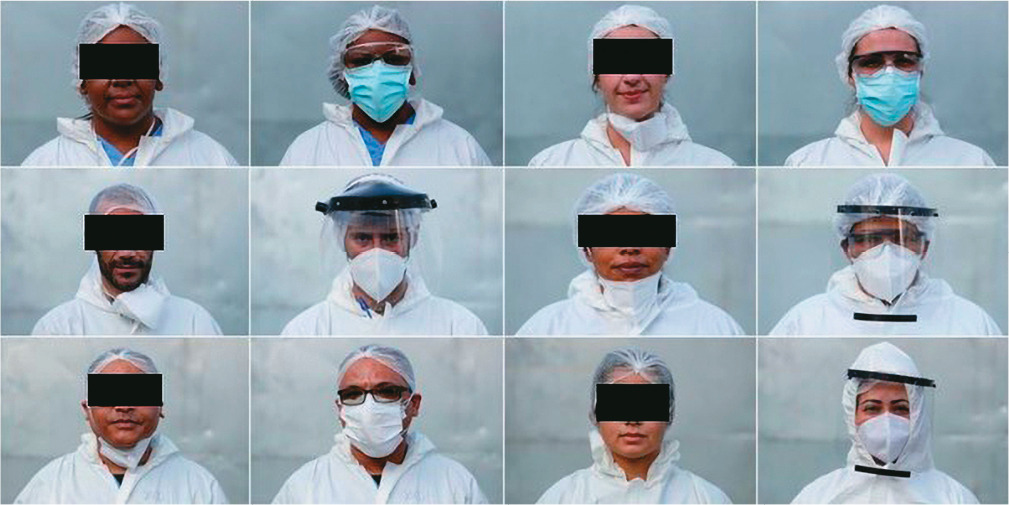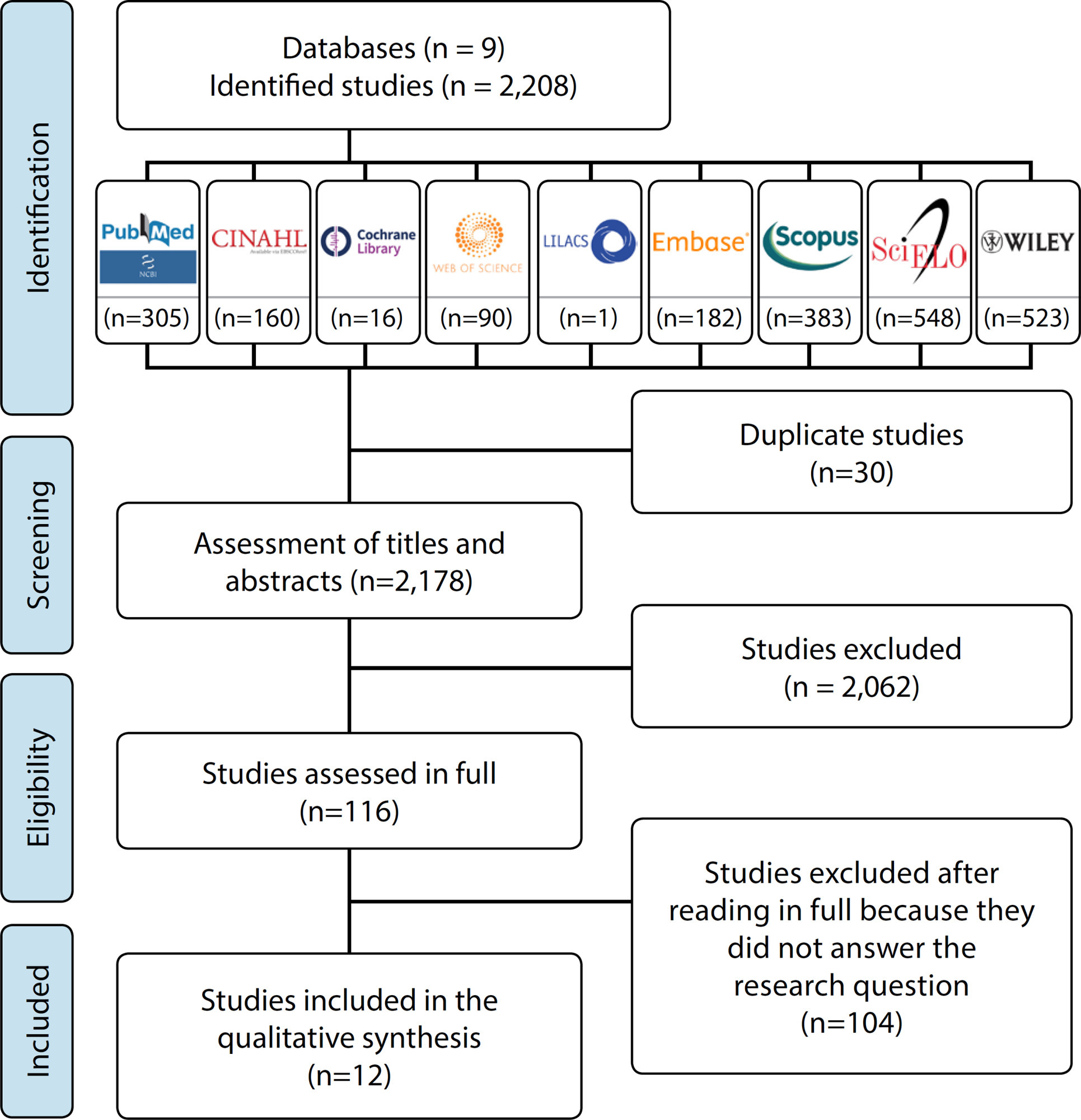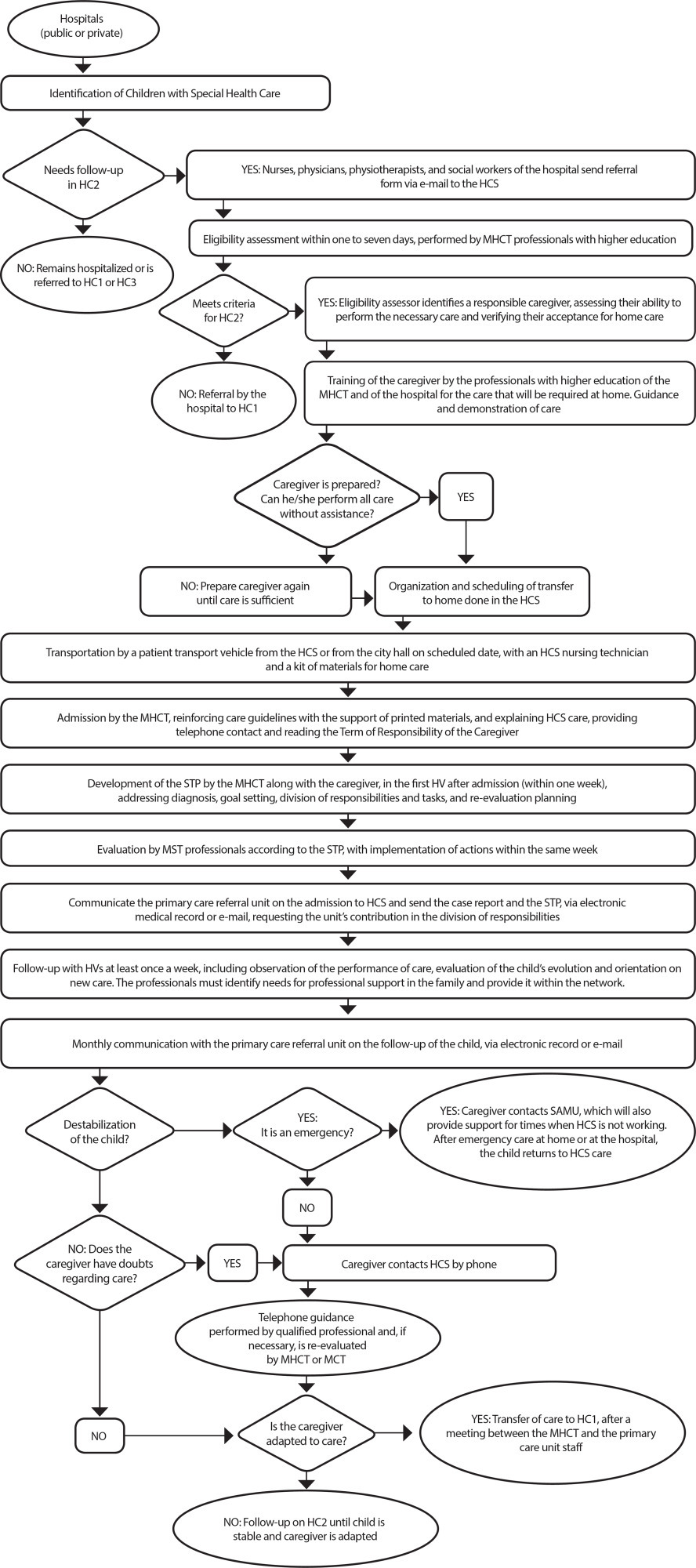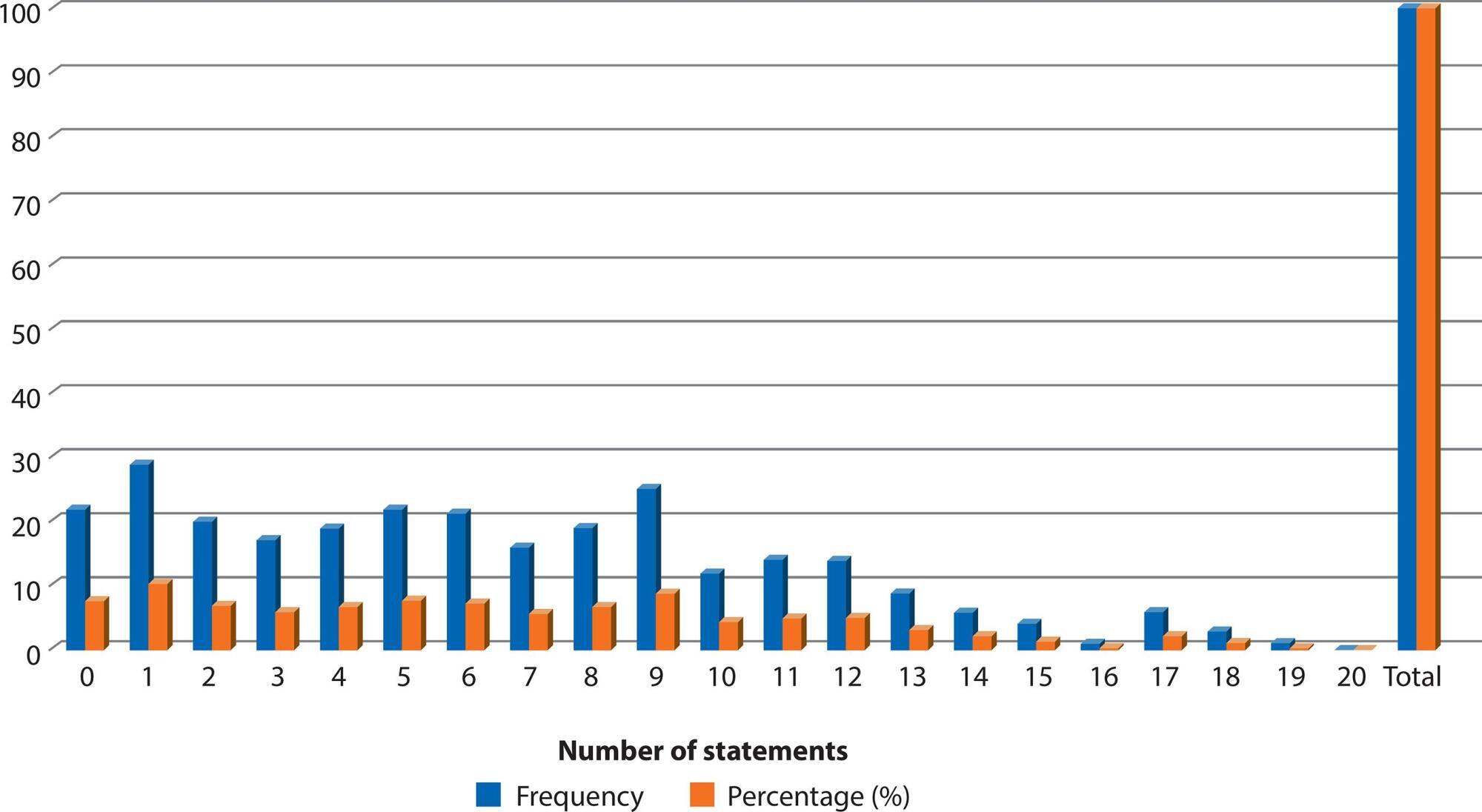-
EDITORIAL01-01-2016
Discoveries of Biological Sciences and their implications for nursing practice
Revista Brasileira de Enfermagem. 2016;69(4):619-620
Abstract
EDITORIALDiscoveries of Biological Sciences and their implications for nursing practice
Revista Brasileira de Enfermagem. 2016;69(4):619-620
DOI 10.1590/0034-7167.2016690401i
Views0For the longest time, the production of knowledge in the field of biological sciences was viewed as the exclusive responsibility and competence of medical professionals. This scenario has changed in light of the worldwide trend of improvements in other health professions, which includes the need to implement the use of evidence-based methodology in nursing practice. […]See more -
REVIEW01-01-2016
Effects from acupuncture in treating anxiety: integrative review
Revista Brasileira de Enfermagem. 2016;69(3):602-609
Abstract
REVIEWEffects from acupuncture in treating anxiety: integrative review
Revista Brasileira de Enfermagem. 2016;69(3):602-609
DOI 10.1590/0034-7167.2016690325i
Views0See moreABSTRACT
Objective:
to evaluate the scientific evidence that is available in the literature on the effects of acupuncture for treating anxiety and on the quality of such studies.
Method:
the study is an integrative review of CINAHL, LILACS, PUBMED-PICO, SciELO, and The Cochrane Library between 2001 and 2014. Keywords anxiety, acupuncture therapy, acupuncture, and anxiety disorders were combined among themselves to ensure a wide search of primary studies.
Results:
among 514 articles, 67 were selected to be fully read and 19 were included. Among these, 11 were found to have strong evidence levels. Among the six articles about randomized clinical studies, five were found to be of reasonable quality. Two studies used acupuncturist nurses to perform their interventions. Its results showed positive and statistically significant effects from using acupuncture for treating subjects with anxiety.
Conclusion:
acupuncture seems to be a promising treatment for anxiety; however, there is a need for improving the methodological quality of the research on this field.
-
REVIEW01-01-2016
Palliative care and spirituality: an integrative literature review
Revista Brasileira de Enfermagem. 2016;69(3):591-601
Abstract
REVIEWPalliative care and spirituality: an integrative literature review
Revista Brasileira de Enfermagem. 2016;69(3):591-601
DOI 10.1590/0034-7167.2016690324i
Views0See moreABSTRACT
Objective:
to analyze scientifi c articles published in international online journals about palliative care and spirituality.
Methods:
an integrative literature review with data collected in September 2014 from the LILACS, SCIELO, MEDLINE/PubMed, and IBECS databases.
Results:
thirty-nine publications were identifi ed and their textual analysis facilitated through four thematic approaches: the meaning of spirituality in the context of palliative care; palliative care and spiritual support; spirituality and relief of pain and other symptoms in patients under palliative care; and instruments to evaluate the spiritual dimension of the scope of palliative care.
Conclusion:
this study examined the relevance of the spiritual dimension in the care of patients with palliative care and the need for developing new studies to disseminate knowledge about this topic.
Descriptors:
Palliative Care; Palliative Care at End of Live; Spirituality; Religion; Health.
-
REVIEW01-01-2016
Educational technologies to encourage (self) care in postpartum women
Revista Brasileira de Enfermagem. 2016;69(3):582-590
Abstract
REVIEWEducational technologies to encourage (self) care in postpartum women
Revista Brasileira de Enfermagem. 2016;69(3):582-590
DOI 10.1590/0034-7167.2016690323i
Views0See moreABSTRACT
Objective:
to evaluate national and international literature regarding the use of educational technologies to encourage self care in postpartum women.
Method:
an integrative review of the literature. The articles were collected from the CINAHL, SCOPUS, PubMed, SciELO, LILACS and Cochrane databases; the time period for the articles referred to January/2004 to July/2014; the languages used in the articles were Portuguese, English, Spanish and French; the articles were selected from the following descriptors: postpartum care period, educational technology, nursing and self care. Twenty-seven articles were selected for analysis
Results:
based on the information found, the scales, counseling and home visits were among the most recommended educational technologies.
Conclusion:
the technologies promote communication, but are sometimes dependent on computer and internet access, which hinder their use by low-income women.

-
RESEARCH01-01-2016
Patients with HIV/Aids and ulcer risk: nursing care demands
Revista Brasileira de Enfermagem. 2016;69(3):574-581
Abstract
RESEARCHPatients with HIV/Aids and ulcer risk: nursing care demands
Revista Brasileira de Enfermagem. 2016;69(3):574-581
DOI 10.1590/0034-7167.2016690322i
Views0See moreABSTRACT
Objective:
to analyze the demand for nursing care and the risk of pressure ulcers (PU) of patients with HIV/Aids.
Method:
quantitative survey, carried out from December 2012 to March 2013 in a public hospital of Teresina, state of Piauí, Brazil.
Results:
the sample of 31 patients was predominantly male, mean age 36.6 years, average care demand 49.4%, most showing some risk of developing PU. The variables correlated with PU risk were care demand and clinical outcome (death). Those associated with care demand were age and clinical outcome (death).
Conclusion:
the results showed that patients require moderate nursing care needs and most of them present risk of developing PU.

-
RESEARCH01-01-2016
The experience of grandmothers of children with cancer
Revista Brasileira de Enfermagem. 2016;69(3):559-565
Abstract
RESEARCHThe experience of grandmothers of children with cancer
Revista Brasileira de Enfermagem. 2016;69(3):559-565
DOI 10.1590/0034-7167.2016690320i
Views0See moreABSTRACT
Objective:
to understand, from grandmothers’ perspectives, the experience of having a grandchild with cancer.
Method:
qualitative study, guided by philosophical hermeneutics. Eight grandmothers of children who had finished an oncology treatment participated in this study. Data were collected through interviews, which were recorded, transcribed, and analyzed according to the principles of hermeneutics.
Results:
the grandmothers underwent an experience of multiplied, silent, transformative, and permanent suffering. They believe it is their role to be present, but they recognize their adult children’s independence and self-determination. Grandmothers highlighted that their experience has been very little accessed and considered by health care professionals.
Conclusion:
we recommend including grandparents in the context of care and in additional research.
-
ORIGINAL ARTICLE10-01-2022
Self-care of elderly people with diabetes mellitus and the nurse-patient interpersonal relationship
Revista Brasileira de Enfermagem. 2022;75(1):e20201257
Abstract
ORIGINAL ARTICLESelf-care of elderly people with diabetes mellitus and the nurse-patient interpersonal relationship
Revista Brasileira de Enfermagem. 2022;75(1):e20201257
DOI 10.1590/0034-7167-2020-1257
Views1INTRODUCTIONChronic non-communicable diseases are the main causes of death and health problems in the world, causing about 41 million deaths each year, which corresponds to approximately 71% of all deaths. Among these diseases, diabetes mellitus has stood out due to the increase in its incidence and prevalence().Estimates indicate that 463 million people live with diabetes […]See more -
ORIGINAL ARTICLE04-14-2023
Guide for Systematization of Care and Nursing Process: educational technology for professional practice
Revista Brasileira de Enfermagem. 2023;76:e20210975
Abstract
ORIGINAL ARTICLEGuide for Systematization of Care and Nursing Process: educational technology for professional practice
Revista Brasileira de Enfermagem. 2023;76:e20210975
DOI 10.1590/0034-7167-2021-0975
Views1ABSTRACT
Objective:
to elaborate and validate the content of a digital guide educational technology on Systematization of Nursing Care and Nursing Process.
Methods:
applied research of technological development, developed between 2020 and 2021, in three steps. First, a scoping review was carried out to elaborate the content. In the second step, the content was validated with 46 nurse judges selected for convenience. The minimum criterion of agreement among judges was 80%. The third step consisted of content organization and layout.
Results:
the guide content was elaborated from the Federal Nursing Council legislation, scientific articles and textbooks. Content was considered appropriate, relevant and organized by judges.
Final considerations:
the digital guide is an alternative that can contribute to the NP execution and implementation, supporting the planning and implementation of actions for quality of care.
Keywords:Educational TechnologyNursing ProcessNursing RecordsProfessional PracticeStandardized Nursing TerminologySee more
-
ORIGINAL ARTICLE03-27-2023
Adaptation and validation of an adult patient classification instrument with emphasis on the family dimension
Revista Brasileira de Enfermagem. 2023;76(2):e20220530
Abstract
ORIGINAL ARTICLEAdaptation and validation of an adult patient classification instrument with emphasis on the family dimension
Revista Brasileira de Enfermagem. 2023;76(2):e20220530
DOI 10.1590/0034-7167-2022-0530
Views1ABSTRACT
Objectives:
to adapt and validate an instrument for classifying adult patients that emphasizes the family support network in the demand for nursing care.
Methods:
methodological study, carried out in three phases: adaptation of an instrument considering the reality of adult patients; content validation with seven experts and assessment of measurement properties (construct validity and internal consistency) with 781 hospitalized patients.
Results:
in content validation, the indicators reached the values established for the Content Validity Index (0.85-1.00). In the confirmatory factor analysis, the 11 indicators were distributed in three domains and presented average variance extracted and factor loading greater than 0.5. Composite reliability was greater than 0.7.
Conclusions:
the present study adapted and made available, with evidence of validity and reliability, an instrument for classifying adult patients that considers the family support network in the demand for nursing care.
Keywords:Factor AnalysisFamilyHospital Organization and AdministrationPatient-Centered CareValidation StudiesSee more
-
ORIGINAL ARTICLE10-17-2022
Ethics, COVID-19 and nursing vulnerability: analysis of photographs released by the media
Revista Brasileira de Enfermagem. 2022;75:e20210960
Abstract
ORIGINAL ARTICLEEthics, COVID-19 and nursing vulnerability: analysis of photographs released by the media
Revista Brasileira de Enfermagem. 2022;75:e20210960
DOI 10.1590/0034-7167-2021-0960
Views1See moreABSTRACT
Objectives:
to analyze nursing vulnerability through photos released by the media amidst the COVID-19 pandemic.
Methods:
a documentary study, with a qualitative approach. The object of analysis were photographic images selected between January 2020 and March 2021, published by the main news portals in countries such as Brazil, the United States, France, Spain, England and Germany. Thematic categorical analysis was the method of analysis used.
Results:
we found 74 photographs that portrayed nursing professionals in different work situations. It was possible to identify stigma and social devaluation about this class’s representation and professional attribution. Moreover, we found an underrepresentation of black professionals in Brazilian portals and the man as the prominent figure in the spaces of claims.
Final Considerations:
the photographs represented an important tool for the social analysis of nursing vulnerability, favoring the unveiling of situations that may go unnoticed by nursing and society.

-
ORIGINAL ARTICLE09-24-2022
Nurses’ performance in palliative care: spiritual care in the light of Theory of Human Caring
Revista Brasileira de Enfermagem. 2022;75(1):e20210029
Abstract
ORIGINAL ARTICLENurses’ performance in palliative care: spiritual care in the light of Theory of Human Caring
Revista Brasileira de Enfermagem. 2022;75(1):e20210029
DOI 10.1590/0034-7167-2021-0029
Views1See moreABSTRACT
Objectives:
to analyze nurses’ role in assisting patients in palliative care, with emphasis on the spiritual dimension, in the light of Theory of Human Caring.
Methods:
this is an exploratory, qualitative study, carried out in a hospital in João Pessoa, Paraíba, between August and December 2019, with 10 nurses. For data collection, semi-structured interviews were used. For analysis, we opted for content analysis.
Results:
the spiritual dimension of care is contemplated by several religious and spiritual practices. These are respected and encouraged by nurses, although there is difficulty in providing care for the spiritual dimension.
Final Considerations:
nurses have attitudes consistent with Jean Watson’s Theory and apply the Caritas Process elements during assistance to patients’ spiritual dimension in palliative care.
-
Evolution of nursing teaching in the use of education technology: a scoping review
Revista Brasileira de Enfermagem. 2021;74:e20200422
Abstract
Evolution of nursing teaching in the use of education technology: a scoping review
Revista Brasileira de Enfermagem. 2021;74:e20200422
DOI 10.1590/0034-7167-2020-0422
Views1See moreABSTRACT
Objective:
To identify and map the technological tools of information and communication to support the teaching learning process in Nursing teaching courses.
Methods:
This is a scoping review whose search was carried out in seven databases and in grey literature. After an initial analysis of the selection, 88 texts were read integrally, and 29 made up the final sample.
Results:
Virtual learning environment and object, simulation, hypermedia, and software or cellphone applications were the tools the nursing professors used the most. Studies highlight that the application of technology was important in the teaching-learning process, since it encouraged teaching based on safe care, motivating and developing abilities/competences, supported on significant, effective, flexible, and autonomous learning.
Conclusion:
The contribution of the technology for nursing formation stands out, but it should be highlighted that its employment must be critical, reflective, based on pedagogical theories and developed by trained professors.

-
ORIGINAL ARTICLE03-19-2021
Mobile application of the Terminology Subset for Coping with Domestic Violence Against Children
Revista Brasileira de Enfermagem. 2021;74:e20200287
Abstract
ORIGINAL ARTICLEMobile application of the Terminology Subset for Coping with Domestic Violence Against Children
Revista Brasileira de Enfermagem. 2021;74:e20200287
DOI 10.1590/0034-7167-2020-0287
Views1See moreABSTRACT
Objective:
to describe the development of a mobile application for the International Classification Terminology Subset for Nursing Practice for Coping with Domestic Violence Against Children.
Methods:
an applied research of technological development, based on the Analysis, Design, Development, Implementation and Evaluation model and on the terminological subset based on the Theory of Nursing Praxis Intervention in Collective Health framework.
Results:
the application is divided into: 1) “Definition”: characterizes the phenomenon of violence against children; 2) “Assistance”: electronic record of nursing care; 3) “Diagnosis Consultation”; 4) “Intervention Consultation”: nursing diagnoses, outcomes, and interventions related to children and their families, subdivided into Strengthening and Weariness group.
Final considerations:
built from scientific research, the application has the potential to support nursing care, presenting, in an organized and systematic manner, nursing diagnoses, outcomes, and interventions, in addition to enabling the registration of cases under monitoring.

-
ERRATUM01-15-2024
ERRATUM
Revista Brasileira de Enfermagem. 2024;77(1):e2024n1e01
Abstract
ERRATUMERRATUM
Revista Brasileira de Enfermagem. 2024;77(1):e2024n1e01
DOI 10.1590/0034-7167.20247701e01
Views1In the article “The ethics of nursing care for transgender people”, with DOI number: , published in Revista Brasileira de Enfermagem, 2023;76(Suppl 3):e20220797, in authorship:Where it read:[…]See more
-
ORIGINAL ARTICLE03-17-2023
Production and validation of an educational video on the use of the Z-Track Technique
Revista Brasileira de Enfermagem. 2023;76(2):e20220439
Abstract
ORIGINAL ARTICLEProduction and validation of an educational video on the use of the Z-Track Technique
Revista Brasileira de Enfermagem. 2023;76(2):e20220439
DOI 10.1590/0034-7167-2022-0439
Views0ABSTRACT
Objective:
to create and validate an educational video on intramuscular drug administration using the Z-track technique.
Methods:
the Delphi Technique was used to validate the script. PhDs in Nursing and PhDs in Social Communication with experience in the production of educational videos participated in the process. After editing, the video was validated by three nursing professors and assessed by students of the undergraduate nursing program at a public university.
Results:
the video was validated by the examiners with 100% agreement in three rounds for script validation and in two for video validation after editing. The duration of the video was 9 minutes.
Conclusion:
after validation by the examiners, students assessed the video and considered it suitable for learning. We This video is expected to aid in the training of nursing professionals and the enhancement of patient care.
Keywords:EducationInjectionsInstructional Film and VideoIntramuscularNursingValidation StudyVideo-Audio MediaSee more -
REVIEW09-06-2022
Biosafety measures to prevent COVID-19 in healthcare professionals: an integrative review
Revista Brasileira de Enfermagem. 2022;75(1):e20201191
Abstract
REVIEWBiosafety measures to prevent COVID-19 in healthcare professionals: an integrative review
Revista Brasileira de Enfermagem. 2022;75(1):e20201191
DOI 10.1590/0034-7167-2020-1191
Views0ABSTRACT
Objective:
to identify the main biosafety measures for preventing COVID-19 in healthcare professionals.
Methods:
this is an integrative literature review, with studies published between January and July 2020, on the MEDLINE/PubMed, Scopus, Embase, Web of Science, LILACS, SciELo, Wiley Online Library, Cochrane CINAHL databases. The selection of studies followed the PRISMA recommendations.
Results:
among the 2,208 publications identified, 12 studies comprised the sample, which enabled the analysis in four thematic categories: The importance of using recommendations about the use of personal protective equipment; The restructuring of new operational and clinical routines and flows in the practice of services; Monitoring professionals, especially testing; Conducting training.
Conclusions:
the phenomena involved are innumerable, covering operational management and the training of teams to deal with highly infectious pathogens and disease outbreaks.
Keywords:Containment of BiohazardsCOVID-19Health PersonnelHospital ServicesPersonal Protective EquipmentSee more
-
ORIGINAL ARTICLE09-21-2020
Organizational flow chart of home care for children with special health care needs
Revista Brasileira de Enfermagem. 2020;73:e20190310
Abstract
ORIGINAL ARTICLEOrganizational flow chart of home care for children with special health care needs
Revista Brasileira de Enfermagem. 2020;73:e20190310
DOI 10.1590/0034-7167-2019-0310
Views0See moreABSTRACT
Objective:
To develop a workflow protocol for Home Care (HC) services in the HC2 modality for children with special health care needs (CSHCN) in the state of Parana.
Method:
Quantitative, descriptive, exploratory, multiple case studies. Data was collected with professionals from the eight home care services in Parana. Data were analyzed using the Strengths, Weaknesses, Opportunities and Threats (SWOT) methodology, from which a 5W2H method of action plan was developed, resulting in a flow chart.
Results:
Considering the strategies found in Home Care services, such as planned hospital discharge, caregiver training, organized transportation and singular therapeutic project, a flow organization protocol for children with special health care needs in Home Care services was developed.
Conclusion:
The protocol developed makes it possible to organize the care provided to children with special health care needs in home care.

-
EXPERIENCE REPORT12-04-2020
COVID-19 pandemic: report on the use of auriculotherapy to optimize emergency workers’ health
Revista Brasileira de Enfermagem. 2020;73:e20200507
Abstract
EXPERIENCE REPORTCOVID-19 pandemic: report on the use of auriculotherapy to optimize emergency workers’ health
Revista Brasileira de Enfermagem. 2020;73:e20200507
DOI 10.1590/0034-7167-2020-0507
Views0See moreABSTRACT
Objective:
To report the use of auriculotherapy to optimize emergency workers’ health during the COVID-19 pandemic.
Methods:
Experience report of auriculotherapy application in 48 workers of a mobile emergency care service center located in a city in the Northeast of Brazil.
Results:
Six auriculotherapy sessions were held, each lasting eight minutes, based on specific protocols in the area and Chinese energy physiology. The aim of the practice was to contribute to the improvement of physical (pain) and emotional (anxiety, stress) symptoms, and the promotion of greater health and willingness to work. In addition, the experimentation of this practice was thought of as a pilot for the creation of a care service for workers.
Final Considerations:
In the report of auriculotherapy, the description of its application and its positive and negative points in relation to professionals working in the pandemic scenario were considered and its continuity was requested.

-
ORIGINAL ARTICLE02-10-2020
Common mental disorders in nursing technicians of a university hospital
Revista Brasileira de Enfermagem. 2020;73(1):e20180513
Abstract
ORIGINAL ARTICLECommon mental disorders in nursing technicians of a university hospital
Revista Brasileira de Enfermagem. 2020;73(1):e20180513
DOI 10.1590/0034-7167-2018-0513
Views0ABSTRACT
Objective:
To verify the prevalence of common mental disorders and associated factors in nursing technicians.
Method:
Cross-sectional analytical study conducted at a university hospital. A questionnaire with sociodemographic, educational and work-related variables and the Self Reporting Questionnaire-20 were used to verify the presence of common mental disorders. Association analysis was performed using the chi-squared test, with a significance level of 5%.
Results:
280 nursing technicians participated in the study. The prevalence of common mental disorders was 46.9%. The variables family income (p=0.021) and working exclusively in health area (p<0.001) were associated with the outcome. There was a higher prevalence of CMD among individuals with a family income below four minimum wages (PR=1.41) and among professionals who worked exclusively in the health area (PR=1.95).
Conclusion:
Approximately half of the nursing technicians of the university hospital presented common mental disorders, which were associated with economic and work-related variables.
Keywords:Hospitals, UniversityMental DisordersMental HealthNursing Human ResourcesOccupational HealthSee more
-
ORIGINAL ARTICLE02-10-2020
Relationship between quality of life, self-esteem and depression in people after kidney transplantation
Revista Brasileira de Enfermagem. 2020;73(1):e20180245
Abstract
ORIGINAL ARTICLERelationship between quality of life, self-esteem and depression in people after kidney transplantation
Revista Brasileira de Enfermagem. 2020;73(1):e20180245
DOI 10.1590/0034-7167-2018-0245
Views0See moreABSTRACT
Objective:
to assess the relationship between health-related quality of life with depression and self-esteem of people after kidney transplantation.
Method:
a cross-sectional study of 47 outpatients from October 2016 to February 2017. The following tools were applied: The Medical Outcomes Study 36-Item Short-Form Health Survey, Beck Depression Inventory and Rosenberg Self-Esteem Scale. Descriptive statistics and Spearman correlation were used.
Results:
women had lower scores for health-related quality of life. Young adults, people with up to one and a half years of transplantation and those who had dialysis for more than one year had higher scores.
Conclusion:
the health-related quality of life of people with chronic kidney disease after transplantation ranged from good to excellent. The presence of depression was not identified. The relationship of data indicates that the higher the quality of life, the better the self-esteem assessment.
-
ORIGINAL ARTICLE05-21-2021
Adherence of the nursing team to patient safety actions in neonatal units
Revista Brasileira de Enfermagem. 2021;74(2):e20200765
Abstract
ORIGINAL ARTICLEAdherence of the nursing team to patient safety actions in neonatal units
Revista Brasileira de Enfermagem. 2021;74(2):e20200765
DOI 10.1590/0034-7167-2020-0765
Views0See moreABSTRACT
Objectives:
to describe the nursing team’s adherence to patient safety actions in neonatal units using a validated instrument.
Methods:
a cross-sectional study, carried out through direct observation of the nursing team and descriptive analysis of 182 records of the “Checklist for patient safety in nursing care during hospitalization in Neonatal Intensive Care Units” in a hospital in the municipality of Belo Horizonte.
Results:
there was evidence of adherence greater than 90.0% in the units concerning the use of the identification wristband and guidance of the companions. It was identified 79.0% of absence on the checking of wristband identification and 59.0% of the absence of an evaluation of the crib wheels’ locks. Three of the 21 items included in the checklist did not show non-conformities.
Conclusions:
partial adherence to patient safety actions was observed, especially regarding the target of patient identification and prevention of falls, which exposes newborns to preventable adverse events.
Search
Search in:
Nuvem de Tags
Aged (144) Atenção Primária à Saúde (239) COVID-19 (104) Cuidados de Enfermagem (269) Educação em Enfermagem (151) Educação em Saúde (139) Enfermagem (930) Estudos de Validação (131) Health Education (144) Idoso (208) Mental Health (149) Nursing (987) Nursing Care (306) Patient Safety (151) Primary Health Care (284) Qualidade de Vida (104) Quality of Life (106) Saúde Mental (145) Segurança do Paciente (150) Validation Studies (108)



